
February 28
1833 Birth: Alfred von Schlieffen—Count, Prussian general, field marshal: Alfred von Schlieffen was born in Berlin, Germany, in 1833. He attended the Berlin War Academy (1858-61) and was a staff officer during the Austro-Prussian War (1866). In 1891 Schlieffen replaced Helmuth von Moltke as Chief of General Staff. Schlieffen feared that France and Russia would join together to attack Germany. His main concern was to devise a plan.
1844 Armaments: President John Tyler narrowly escapes death:
[The President was cruising] the Potomac with 400 others aboard the U.S. Navy's new steam frigate USS Princeton, not realizing that his life will soon be in danger . . . . The Princeton carried a brand new 12-inch, 27,000-pound cannon called the Peacemaker. The gun's co-designer, John Ericsson, argued with the ship's captain, who wanted to demonstrate the new weapon, over whether it was safe to discharge because he feared it had not been sufficiently tested. Days before the cruise, Captain Robert Stockton had boasted about the Navy's new ship and armament, which he had helped design, to congressmen and reporters. He and the crew were eager to show off the cannon's ferocity, and despite Ericsson's warnings, Stockton insisted on firing the cannon during the Potomac cruise. The first two successful and ear-splitting volleys sent the crowd into wild applause . . . .
Then the secretary of war asked for a third firing . . . . Stockton may have recalled Ericsson's concerns or thought it best not to push their luck with the new cannon, because he initially refused the secretary's request. In the end, though, he bowed to his superior's wishes . . . . The third round proved deadly. In the worst peacetime disaster of its time, the cannon exploded, killing several aboard.
Second Reich: The Year of the Three Emperors:
Frederick III (1831-1888) was German Emperor and King of Prussia for 99 days in 1888 during the Year of the Three Emperors. Following the unification of Germany in 1871 his father, William I‑-then King of Prussia‑-became the German Emperor, and on William's death at the age of 90 on 9 March 1888, the throne passed to Frederick, having by then been the Crown Prince for 27 years
Frederick was suffering from cancer of the larynx and died on 15 June 1888, aged 56, following unsuccessful medical treatments for his condition. The timing of Frederick's death, and the length of his reign, are important topics among historians. The reign of Frederick III is considered a potential turning point in German history; many historians believe if Frederick succeeded to the throne sooner, he would have transformed Germany into a liberal state. They argue this would have averted the events preceding World War I. Other historians contend that Frederick's influence and political leanings were greatly exaggerated, noting that he tended to defer to his father and Bismarck when confronted, and would not have dared to challenge their conservatism even as ruler . . . . William II [his heir] abandoned all of his father's policies and ideas, and eventually led Germany into World War I.
1894 Birth: Ben Hecht: Novelist, playwright, and screenwriter, born on this day in New York City to Russian Jewish immigrants:
Hecht's family moved to Racine, Wisconsin, where Hecht attended high school. He started studies at the University of Wisconsin but soon quit and took a job chasing down photos of crime victims for the Chicago Journal, which paid him $12.50 a week. Hecht later became a star reporter, known for his sensational and colorful, if not always accurate, stories. Another paper, the Chicago Daily News, sent him to Berlin to cover the aftermath of World War I, which inspired his first novel, Erik Dorn (1921).
1916 World War I: German Cameroons surrenders to Allied forces:
Drawn by the rich trade of slaves, ivory and rubber established in the 17th century, German and British settlers began to explore inland Africa beginning around 1860. In 1884, Germany established a protectorate over the Douala region; Britain did not dispute the claim. By the early 20th century, Germany had built roads, begun the construction of a railroad and cultivated large plantations of cacao, palm and rubber in the region. They had also built a city, Douala, on the Atlantic coast, which by 1914 served as the principal port and wireless station in the Cameroons.
The British launched their campaign in the German Cameroons in late summer 1914, just after the outbreak of World War I; it would last 18 months. The British failed to anticipate the German strategy: knowing the formidable strength of the British navy, the Germans decided not to concentrate on defending the coast, but instead to withdraw inland and use the rough interior of the continent to fortify their resistance. Thus, although British forces earned quick successes— they secured Douala by September 27, 1914, without firing a shot— they were not able to fully take control of the Cameroons until the following February.
The West African Frontier Force, fully committed in the Cameroons until March 1916, was one of two sets of "local" troops that the British turned to in Africa; the other was the South African Defense Force, which concentrated on the campaign in German Southwest Africa (now Namibia). African soldiers in World War I were generally compelled to enlist or were mercenaries. Some served on both sides during the war.
In 1919, during the Versailles peace conference, Britain was given a mandate over one-fifth of the former German Cameroons; the rest was assigned to France. A mandate was a commission granted by the newly created League of Nations allowing member states of the League to establish their own governments in former German territories. Both the British and French Cameroons were made trust territories of the United Nations after World War II. The French Cameroons gained their independence in 1960 as the Republic of Cameroon. The following year, after a U.N. plebiscite was conducted in the British Cameroons, the southern half of the territory joined the Republic of Cameroon, while the Northern Cameroons became part of Nigeria. (History.com)
1918 World War I: Official Statement of Belgian Prime Minister on the Fourteen Points:
The Belgian Government's views are known and have not changed. It affirmed them quite recently. In its answer to the Holy See on December 24th the Belgian Government said: The integrity of the metropolitan and colonial territory; political, economic and military independence without condition or restriction; reparation for damages and guarantees against repetition of the aggression of 1914 are the indispensable conditions for a just peace as far as Belgium is concerned. The Belgian Government has already declared and repeated that it will not discuss peace except in consort with the powers which guaranteed its independence and which have fulfilled their obligations toward Belgium.
1919 League of Nations: Henry Cabot Lodge addresses his colleagues during debate in the US Senate: We now in this draft bind ourselves to submit every possible international dispute or difference either to the league court or to the control of the executive council of the league. That includes immigration, a very live question, to take a single example. Are we ready to give to other nations the power to say who shall come into the United States and become citizens of the Republic? If we are ready to do this, we are prepared to part with the most precious of sovereign rights, that which guards our existence and our character as a Nation. Are we ready to leave it to other nations to determine whether we shall admit to the United States a flood of Japanese, Chinese, and Hindu labor? 1919 Volkishness: Eberhard von Brockhusen writes another letter to General Heimerdinger of the Germanenorden, again asking to be relieved of his office as Grand Master of the loyalist branch. (THP)
1925 Death: Friedrich Ebert: Social-democrat president of Germany. [For further details, Click here.]
1926 Birth: Svetlana Alliluyeva—born Svetlana Josifovna Stalina—[author of] My Life; youngest child and only daughter of former Russian leader Joseph Stalin, will cause an international furor by defecting to the United States in 1967. Will become a naturalized citizen of the United States, and will wed William Wesley Peters, a noted architect, in 1970. She has ever since used the name Lana Peters. The couple had a daughter, Olga, but the marriage dissolved soon afterward. In 1982, will move with her daughter to Cambridge, Britain, and in 1984 will return to the Soviet Union, where they will be granted citizenship, and settle in Tbilisi. In 1986 she will return to the US, and later move back to Britain in the 1990s, where she now lives in a retirement home.
1933 Nazi Germany: Various: The Decree for the Protection of the People and the State
The Nazis convinced President von Hindenburg to sign the so-called 'Reichstag Fire Decree' [a] Decree by the Reich President for the Defence of People and State . . . . In reality, this decree gave the Reich Chancellor (Hitler) almost unrestricted powers to imprison any political opponent. Hitler used these powers to have communists arrested and thus forced out of the elections. The Reichstag Fire Decree was originally planned to be in effect for only a brief period of time. In reality, however, it was kept in effect throughout World War II. It was used, among other things, as the legitimisation for Gestapo's arrests and the confining of people to concentration camps, thus circumventing the regular judicial system.
German Communists: Round-up by the SA and SS quickly begins. 1934 Nazi Germany: Various: Army and SA: Army and Racism:The Wehrmacht issues orders applying racial criteria to German military service. 1936 Ni-niroku jiken: The Emperor signs a formal command ordering the Army and Navy to jointly suppress the revolt. [See: Countdown to Infamy: Timeline to Pearl Harbor.] 1940 World War II: Various: 1941 America First Committee (AFC): Senator Burton Wheeler in a speech in the Senate declares that Jews are attempting to involve America in the war against Germany.
In September 1940, Wheeler helped Charles A. Lindbergh and Norman Thomas to form the America First Committee (AFC). It soon became the most powerful isolationist group in the United States. The AFC had four main principles: (1) The United States must build an impregnable defense for America; (2) No foreign power, nor group of powers, can successfully attack a prepared America; (3) American democracy can be preserved only by keeping out of the European War; (4) "Aid short of war" weakens national defense at home and threatens to involve America in war abroad. The AFC influenced public opinion through publications and speeches and within a year had over 800,000 members. The AFC was dissolved four days after the Japanese Air Force attacked Pearl Harbor. [See: Why Did the US Join the Fight Against Hitler?]
1942 World War II: Various: War in the Pacific: 1944 Hannah Reitsch pitches suicide squad to Hitler: Famed test pilot Hanna Reitsch arrives at the Berghof to meet with Hitler. The V-1 is too inaccurate, she tells him. She urges him to begin a piloted suicide rocket (Reichenbergs) program and volunteers for it. Hitler immediately rejects the notion, saying that it is not the right psychological moment for such an idea to be presented to the German people. When Hitler changes the subject to jets, Reitsch interrupts him: "Mein Fuehrer, you are speaking of the grandchild of an embryo." Pressing him, she eventually gets his reluctant consent to begin experimental work on the piloted rocket as long as he is not pestered about it during its development. (Toland) [See: Wunderwaffen: Hitler's Deception and the History of Rocketry.] Joseph Goebbels attacks the Jews:
One must understand the Jewish question in order to understand the present state of the war. How else could one explain the following facts: The Axis powers are fighting for their lives in a world-wide struggle, facing eastern Bolshevism on the one side, the most blatant and most radical expression of international socialism, and western plutocracy on the other side, the most blatant and most radical expression of international capitalism. Bolshevism is attempting to put on a veneer of Western civilization, while plutocracy is putting on the Jacobin hat as needed and speaks in a revolutionary mish-mash that attempts to conceal the remaining distance between it and Bolshevism. The Kremlin tells Downing Street and the White House that the plutocracy reigning there is not all that bad.
1945 World War II: Various:
Goebbels on Goering: Goebbels is still furious at Goering, whom he blames for the firebombing of Dresden and the inability of the Luftwaffe to do anything against the Allied air offensive. 'What a burden of guilt this parasite has brought on his own head, for his slackness and interest in his own comfort,' he tells his aides. 'Why didn't the Fuehrer listen to my earlier warnings? But I was always called a pessimist and an ignorant civilian, who could not understand military matters.' He continues, later that night, to rage against Goering to his diary: 'Fools covered with medals and vain, perfumed fops have no place in the conduct of war. Either they change or they must be eliminated.' The total number of German soldiers captured in February alone is 280,000 with a death toll of 350,000. (Semmler, Read) [See: Why Didn't Adolf Hitler Fire Hermann Goering?] FDR returns to Washington from the Yalta Conference: (Lilianthal) When Franklin came back from Yalta I told him how disappointed I was, and rather shocked, that Estonia, Lithuania, and Latvia had been left with the Soviet Union, upon Stalin's insistence, instead of being given their independence and freedom. Franklin said—now mind you I don't say he was right or wrong, but this shows the reasoning he had in his mind—Franklin said (and I can still see his face as he said it) he had thought about this for a long time. He asked me: 'How many people in the United States do you think would be willing to go to war to free Estonia, Lithuania, and Latvia?' I said I didn't suppose there would be very many. 'Well,' he said, 'if I had insisted on their being freed I would have to consider what I would do to back up that decision, which might require war. And I concluded that the American people did not care enough about the freedom of those countries to go to war about it. He (FDR) says he felt well all the time & feels evidently that all went well. He liked Stalin better & felt they got on better than before. He says his one complete failure was with Ibn Saud on Palestine but says F: 'he is 75 & has been wounded 9 times, it will be easier to deal with the son who comes to power.' I believe there are 49 sons! (Lash II) 1946 Nuremberg Tribunal: Prosecution's Definition of the Criminality of Organizations (by US Supreme Court Associate Justice Robert Jackson, Chief Counsel for the United States):
The Nazi despotism, therefore, did not consist of these individual defendants alone. A thousand little Fuehrers dictated; a thousand imitation Goerings strutted; a thousand Schirachs incited the youth; a thousand Sauckels worked slaves; a thousand Streichers and Rosenbergs stirred up hate; a thousand Kaltenbrunners and Franks tortured and killed; a thousand Schachts and Speers and Funks administered and supported and financed this movement. [For the full text of today's proceedings, Click here.]
1994 First NATO Military Action:
In the first military action in the 45-year history of the North Atlantic Treaty Organization (NATO), U.S. fighter planes shoot down four Serbian warplanes engaged in a bombing mission in violation of Bosnia's no-fly zone.
The United States, 10 European countries, and Canada founded NATO in 1949 as a safeguard against Soviet aggression. With the end of the Cold War, NATO members approved the use of its military forces for peacekeeping missions in countries outside the alliance and in 1994 agreed to enforce U.N. resolutions enacted to bring about an end to the bloody conflict in the former Yugoslavia. In 1994 and 1995, NATO planes enforced the no-fly zone over Bosnia-Herzegovina and struck at Bosnian Serb military positions and airfields on a number of occasions. [For further information, click here]
Edited by Levi Bookin (Copy editor)
FAIR USE NOTICE: This site may contain copyrighted material the use of which has not always been specifically authorized by the copyright owner. We are making such material available in our efforts to advance understanding of historical, political, human rights, economic, democracy, scientific, environmental, and social justice issues, etc. We believe this constitutes a 'fair use' of any such copyrighted material as provided for in section 107 of the US Copyright Law. In accordance with Title 17 U.S.C. Section 107, the material on this site is distributed without profit to those who have expressed a prior interest in receiving the included information for research and educational purposes. If you wish to use copyrighted material from this site for purposes of your own that go beyond 'fair use', you must obtain permission from the copyright owner.
Please note that the list-owner and the moderator are not responsible for, and do not necessarily approve of, the random ads placed on our pages by our web server. They are, unfortunately, the price one pays for a 'free' website.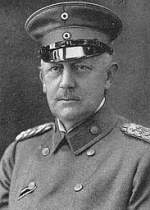
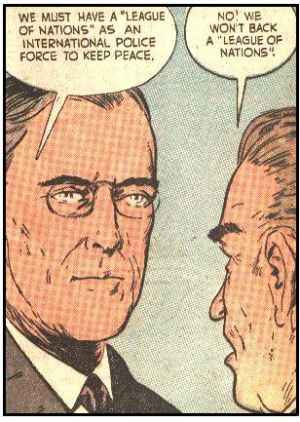
Mr. Taft has announced, in an article which appeared in the National Geographic Magazine, that the question of immigration will go before the international tribunal, and he says now that all organized labor is for the league. If American labor favors putting the restriction of immigration in the control of other nations they must have radically changed their minds and abandoned their most cherished policy . . . .
Unless some better constitution for a league can be drawn, it seems to me, after such examination as I have been able to give, that the world's peace would be much better, much more surly prompted, by allowing the United States to go on under the Monroe Doctrine, responsible for the peace of this hemisphere, without any danger of collusion with Europe as to questions among the various American States, and if a league is desired it might be made up by the European nations whose interests are chiefly concerned. 
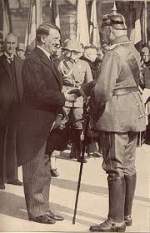

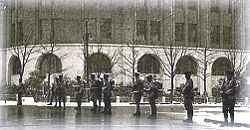
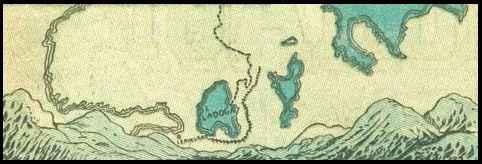

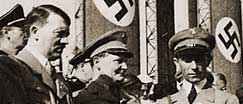
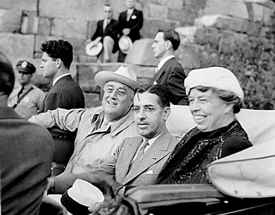


levi.bookin@gmail.com






